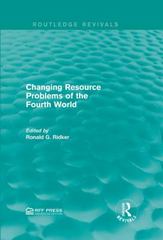Question
1. Explain and discuss the problems or barriers to gender integration in development policy. What are the main concerns? How did development policy-makers address these
1. Explain and discuss the problems or barriers to gender integration in development policy. What are the main concerns? How did development policy-makers address these concerns and overcome them? If not overcome, why not?
2. Explain and discuss the postcolonial critiques of how the "Third World Woman" is constructed in opposition to the "First World/Western Woman", and the consequences of such binary images. In which ways have neoliberal policies advanced a liberal feminist agenda? Is this sufficient for ALL women to achieve FULL or equal "development", why or why not?
3. Explain and discuss how power relations are embedded in market exchanges as explained by institutional economists, and why it is relevant to the study of women and gender. Think of some alternative market or non-market exchanges that are or would be more beneficial for women (and men).
4. Compare and contrast feminist critiques of the basic assumptions of 'homo economicus'. How do these explanations, assumptions and critiques align with your own behavior and your observations of others' behaviors--or put more succinctly: when do they align and when don't they?
5. The 'good life' development strategies that the Global North has followed and shared with the Global South has/is resulting in growing climate change catastrophe, whereby it is virtually impossible for the Global South to attain this 'good life' without effecting climate collapse. In this context, explore the ethical responsibilities of the Global North to the Global South and their economic development--what the author says about this, what the international conversations are (do some minimal research if necessary), what are your thoughts and ideas?
6 .What does the ethics of markets involve and how does it relate to human security and environmental change? For example, given the coronavirus pandemic's worse effects on poor people (who live in crowded areas and don't have access to affordable healthcare) and women (who have the majority of responsibilities for family caregiving), what would the ethical considerations be to have housing, healthcare, food, and other essential goods/services NOT subject to market allocations? Can there be an ethics of markets that adequately address this?
Step by Step Solution
There are 3 Steps involved in it
Step: 1

Get Instant Access to Expert-Tailored Solutions
See step-by-step solutions with expert insights and AI powered tools for academic success
Step: 2

Step: 3

Ace Your Homework with AI
Get the answers you need in no time with our AI-driven, step-by-step assistance
Get Started


